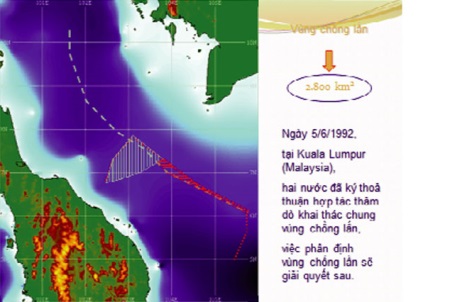 |
| Maritime delimitation between Vietnam and Malaysia (photo: thuysanvietnam.com.vn) |
Maritime delimitation is an international activity aimed at establishing maritime border (internal and territorial waters) and maritime boundaries (exclusive economic zone and continental shelf) between two or many countries with opposite or adjacent coasts via intermediary negotiation or international jurisdiction. Grounded on those mechanisms, states would manage, protect, and exploit natural resources within national waters according to their delimited maritime border and boundaries to make contributions to maintaining security, safety, peace, and stability at sea.
Regarding the delimitation of maritime boundaries, the Article 15 of the 1982 United Nations Convention on the Law of the Sea (UNCLOS 1982) stipulates that “Where the coasts of two States are opposite or adjacent to each other, neither of the two States is entitled, failing agreement between them to the contrary, to extend its territorial sea beyond the median line.” For the delimitation of the exclusive economic zone and continental shelf, the Articles 74 and 83 of the UNCLOS 1982 specifies that “The delimitation of the exclusive economic zone between States with opposite or adjacent coasts shall be effected by agreement on the basis of international law, as referred to in Article 38 of the Statute of the International Court of Justice, in order to achieve an equitable solution.” However, for many different reasons, there has not been an agreement on the delimitation of the entire maritime border and boundaries between States, thereby leading to complex, long-term disputes, particularly in the East Sea. Some major powers have not conformed to the principle of agreement and equality. They have drawn maritime border and boundaries by their own and even violated the UNCLOS 1982, thus negatively affecting the general relations between countries within regions. Against that backdrop, as the highest-level international legal organisation, the United Nations should promote its core role in maintaining international law and ensuring equality and benefits for coastal countries. Besides, countries should enhance their fight against hegemonic thought and action at sea that will undermine regional peace and stability.
As for Vietnam, the Article 4 of the Law of the Sea of Vietnam (2012) stipulates that “The State of Vietnam settles disputes related to the sea and islands with other countries by peaceful means, in conformity with the 1982 United Nations Convention on the Law of the Sea, and international law and practices.” When delimiting maritime border and boundaries with other relevant countries, Vietnam has always abided by international law and practices, especially the UNCLOS 1982 and taken circumstances and natural conditions within the areas of delimitation into account to achieve an equitable and acceptable solution.
Maritime delimitation provides a foundation of central importance for maintaining peace and stability at sea and enabling countries to exploit maritime resources for their economic development. Therefore, the United Nations and coastal countries should delimit maritime border and boundaries under the principle of agreement and equality to make contributions to ensuring maritime security, safety, peace, stability, and sustainability.
Nguyen Duc Phu